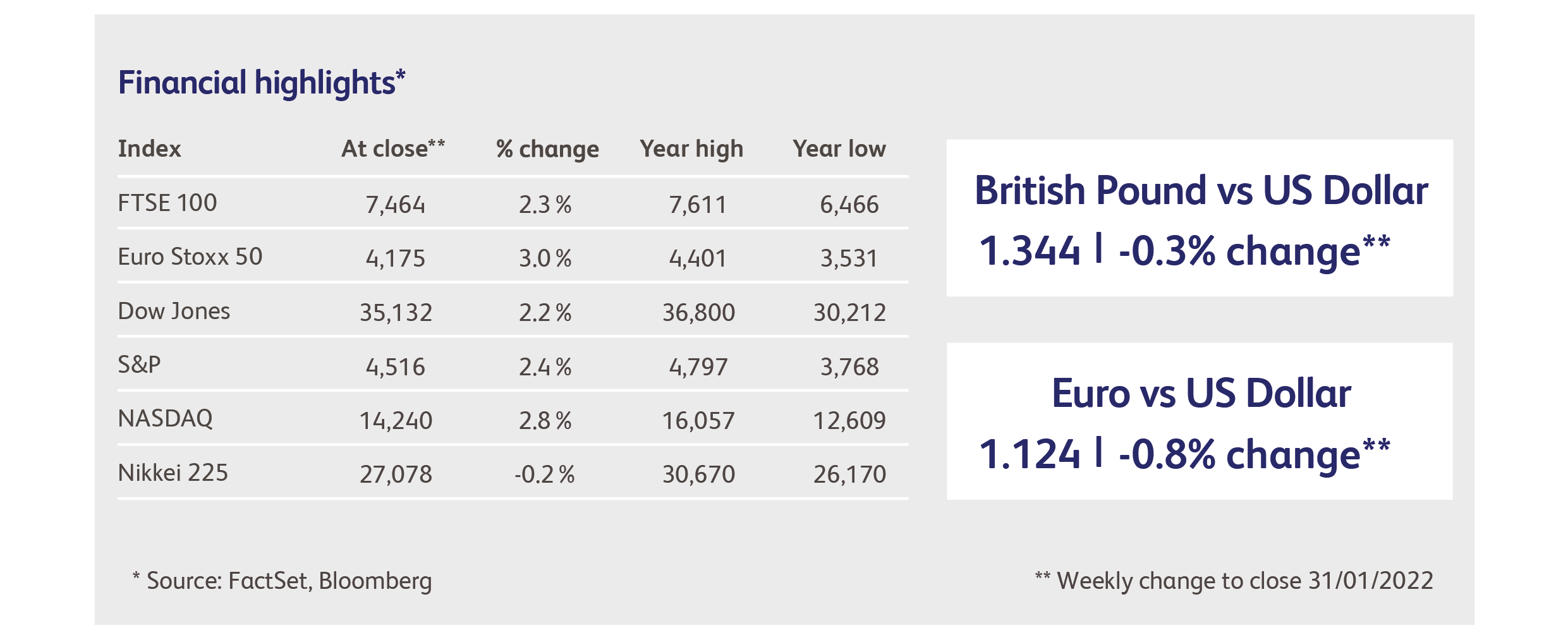
1 February 2022
Enthusiasts for buying the dip were finally rewarded this week, as stock markets reclaimed some of their lost ground since the beginning of the year. The bounce was broad-based, with the technology sector, smaller-companies and cryptocurrencies all participating to varying degrees. Markets eventually overcame a wobble caused by the US Federal Reserve’s monthly press conference, at which Chairman Powell talked up the possibility of further interest rate rises and confirmed the central bank’s new-found focus on inflation.
High volatility persisted, with several intra-day moves during the week exceeding 3% across the major indices. Data suggest that smaller US investors are doing most of the buying, undaunted by the signs of rising stress. Bank of America estimated that American equity funds took in over $17 billion of new money in the previous week, making a total of $84 billion already this year. The buying wasn’t limited to US equities, with Emerging Market companies enjoying their largest weekly inflow in nearly a year.
The big question for investors is whether to chase the violent rotation from technology companies, and other growth stocks, into traditional value stocks. The next few months promise further excitement and, perhaps, markets are justified in being so febrile. On one hand, there is the $4 trillion in excess savings that have accrued to American consumers through the government’s stimulus programmes. This amount of additional saving, which is a third bigger than the size of the entire UK economy, may well be driving the flows into equity funds and promises to unleash some spectacular investment opportunities.
On the other hand, however, are inflation, rising interest rates and the lingering effects of the pandemic. Recent economic data suggest that the impact of Omicron on the US economy has been surprisingly large: jobs data, surveys of business activity, consumption by private individuals and retail sales have all underwhelmed, prompting forecasters to hack back their expectations for economic growth. This has opened up the possibility that consumers are reacting to inflation, rather than just the Omicron variant, by spending less. Could the recent explosion in the cost of living ultimately deter American consumers from spending their $4 trillion?
Due to the glacial pace at which most economic data becomes available, the full extent of the current slowdown won’t become known until well into the new year. Furthermore, it may be early April before any significant improvement in the US jobs market can be observed in the official data, and GDP growth for the first calendar quarter, which is the focus of economists’ concerns, won’t be available until the end of April. It’s fairly predictable, therefore, that inflation will still be rampant, and the Federal Reserve will be raising interest rates, while the full extent of the Omicron-induced slowdown is still becoming visible in the data. This timing is inconvenient, to say the least. It could look a lot like stagflation, and markets could well be sent into another rotation, this time possibly favouring precious metals, commodities and the property sector.

Chevron Corp kicked off the earnings season for the oil industry with disappointing results. Earnings missed analysts’ expectations by nearly a fifth, which the company attributed to the shrinking value of legacy assets, as well as higher royalty and tax payments linked to rising commodity prices. The company also warned that oil and gas production would be flat to down during the present year, compared with 2021. Investors had been expecting better news following a 15% rally since the start of the year, and after touching an all-time high only the previous day. Chevron stock fell as much as 5% following the results announcement.
Shares in Caterpillar also fell 5%, and are now down for the year to date, despite reporting profits that beat analysts’ expectations, along with a 23% increase in sales during the quarter. The company reported surging demand for its construction and mining equipment, though the outlook was somewhat darkened when the Company referred to “headwinds” in the current quarter. Management expects to be able to offset increases in manufacturing costs with increases in prices.
Vodafone’s impressive new year rally was boosted by news that activist investor Cevian Capital has accumulated a significant stake in the company. Cevian is known for its relatively low-key tactics, which typically involve behind-the-scenes lobbying of management rather than very public spats. Vodafone is the fourth large, UK-based company to have been targeted by activist investors recently following Unilever, GlaxoSmithKline and Shell. Vodafone shares are now up 14% year to date.
Tesla shares were only just able to avoid another disappointing week, despite a 65% increase in revenues and beating analysts’ expectations with earnings for the fourth calendar quarter. Founder Elon Musk’s announcement of humanoid robots in Tesla factories couldn’t inspire the kind of rally that investors have become accustomed to. The outlook was the problem here, too, as management highlighted supply chain problems that will prevent the company introducing new models this year. Tesla shares are down 11% year to date.
Highlights
Calendar
This publication is intended to be Walker Crips Investment Management’s own commentary on markets. It is not investment research and should not be construed as an offer or solicitation to buy, sell or trade in any of the investments, sectors or asset classes mentioned. The value of any investment and the income arising from it is not guaranteed and can fall as well as rise, so that you may not get back the amount you originally invested. Past performance is not a reliable indicator of future results. Movements in exchange rates can have an adverse effect on the value, price or income of any non-sterling denominated investment. Nothing in this document constitutes advice to undertake a transaction, and if you require professional advice you should contact your financial adviser or your usual contact at Walker Crips. Walker Crips Investment Management Limited is authorised and regulated by the Financial Conduct Authority and is a member of the London Stock Exchange. Registered office: Old Change House, 128 Queen Victoria Street, London, EC4V 4BJ. Registered in England and Wales number 4774117.
Important Note
No news or research content is a recommendation to deal. It is important to remember that the value of investments and the income from them can go down as well as up, so you could get back less than you invest. If you have any doubts about the suitability of any investment for your circumstances, you should contact your financial advisor.